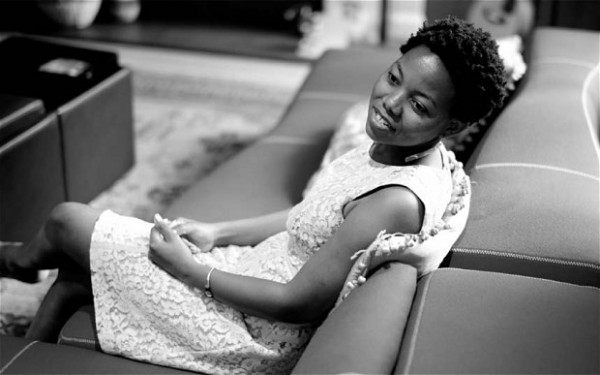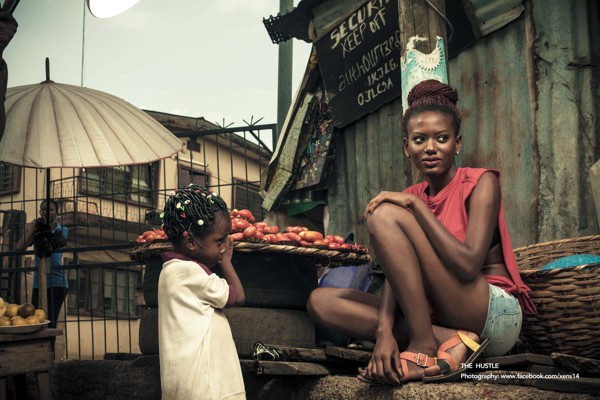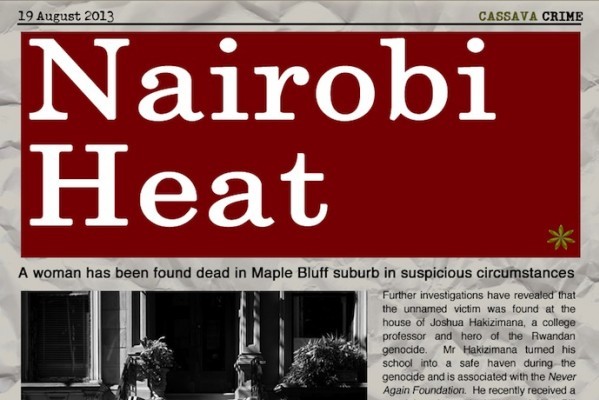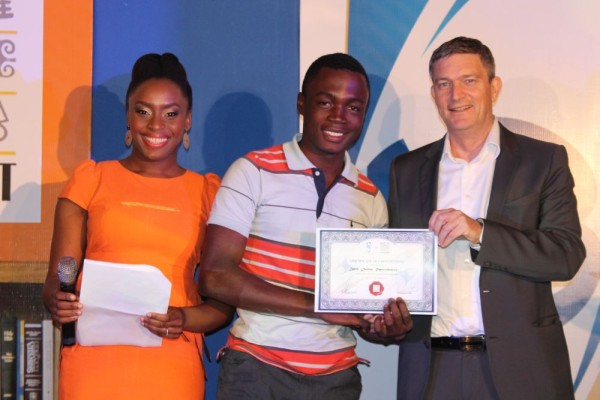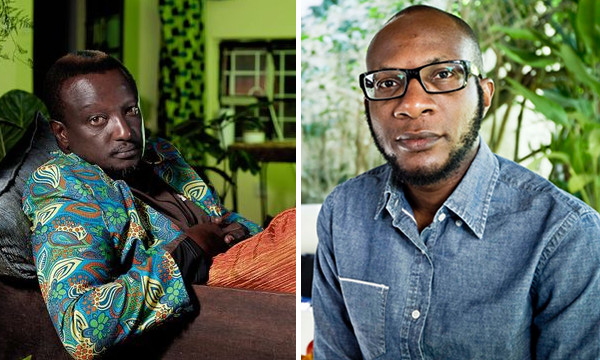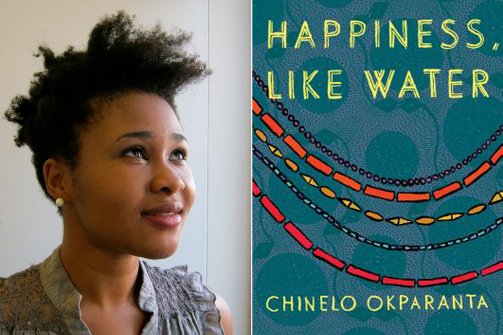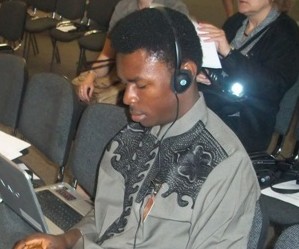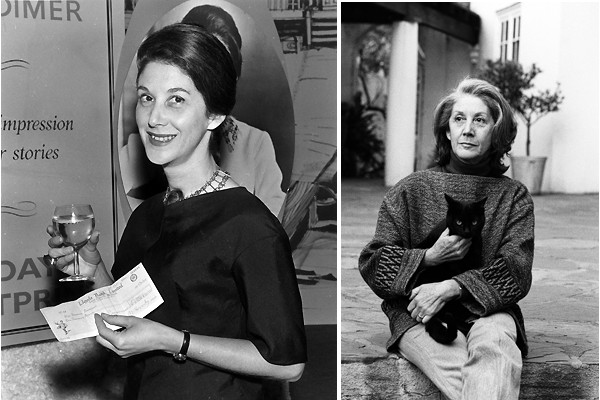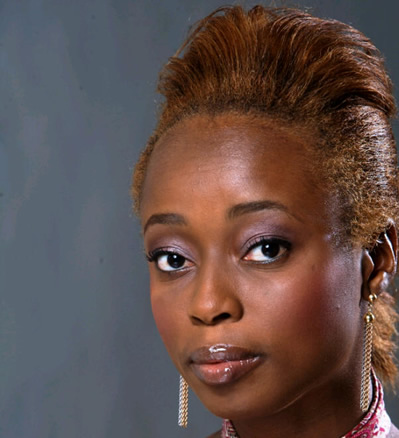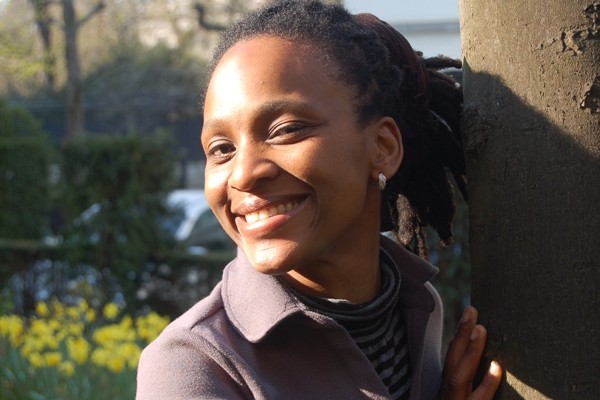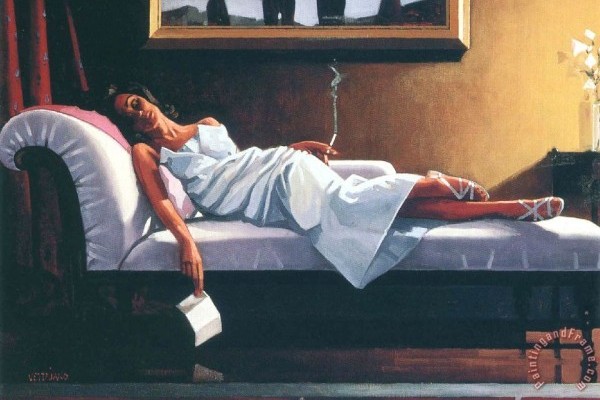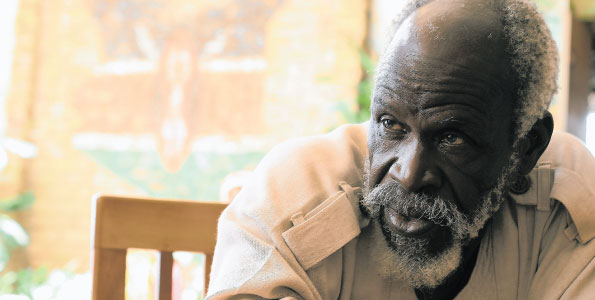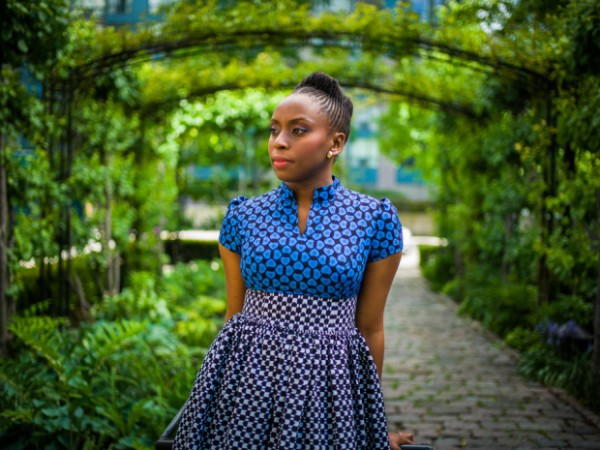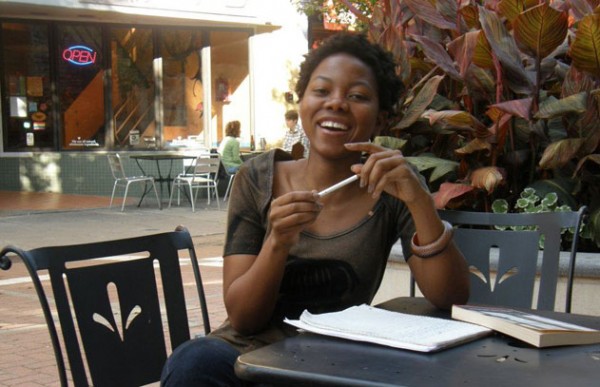![]()
The Association of Nigerian Authors is the premier organization for writers in Nigeria. I’d always wondered about its function in the literary community, so I sent Richard Ali a few questions. Ali is the author of City of Memories and one of ANA’s publicity secretaries. He clarifies a lot of things regarding the place of the organization in the community, makes a good case for anyone who is not sure about the benefits of membership, and reflects on ANA’s involvement in Achebe’s funeral committee. Informative and illuminating interview!
By the way, check out the schedule for the ANA convention set to take place this Thursday in Akure. HERE.
![Achebe at Home]()
What is ANA? Is it a union of sorts, like the Actor’s Guild of Nigeria or is it more like PEN America? Can just anyone become a member?
ANA is the Association of Nigerian Authors and that is descriptive enough, I believe, of at least the scope of the body. It was founded in 1981 by the late Professor Chinua Achebe when he called a meeting of all Nigerian writers at the University of Nigeria, Nsukka, where he was then based. The civil war had ended about ten years before yet writers and their business was still fragmentarily organized, each person writing his own thing and sometimes writers met informally according to the dictates of geography or simply ethnicity. So, Prof decided to do something about this situation and that Nsukka meeting, attending by two Kenyan writers, became the first Convention of the Association of Nigerian Authors.
Regarding structure, it is not a guild in the sense of the AGN—that would be quite impossible really, actors can be censured with pressure being put by the AGN on directors and producers but that is quite impossible with writing. Besides, expression is a fundamental human rights issue. So ANA is more like PEN International except that we are not elitist at all in the way PEN is; it is simply an organization to protect the interests of Nigerian authors and aggrandize their welfare and boost the prestige of our writing generally within and outside the country. In the last three decades, the manner in which these broad objectives have been interpreted has varied from time to time in line with the socioeconomic context of Nigeria and Africa. The present executive, of which I am a part, sees ANA’s objectives as being a sort of craft union for Nigerian writers. Who says it is easier to push papers in a government department all day than to write a short story or a critical essay? More difficult even, I think. So, writers are an interest group whose interests need to be clarified and presented—to State and non-State actors, including the corporate world. This mindset is, of course, a leap from the merely celebrative [and combative, when we were in the throes of the Abacha dictatorship] mindset of the ’90s or the ideological balancing act of the ’80s.
Anyone can be a member of the association. There are four levels of membership. The Associate Members are literature enthusiasts who are not necessarily writers, mostly students and writers who do not yet have a book published. Full Members are writers who have a book published in print who are registered with one of the twenty eight chapters of the Association. There are Institutional Members, such as Colleges and Departments of Literature, English etc while Honorary memberships are reserved to eminent writers like Soyinka and JP Clark, Ngugi wa Thiongo—writers who have and continue to affect the theory and practice of Africana studies as it relates to literature.
![Nigeria Writers Logo ammended]()
So let’s say I’m a writer. Why should I join ANA? What’s in it for me?
Very fine question, Ainehi. As I said a minute ago, the mindset of the present executive coming up for reelection in two weeks time is more businesslike. Writers will only join and participate actively in ANA’s activities if there are benefits to be derived from it beyond mere attendance of end-of-year conventions.
So we set out to execute a raft of programs to ensure this. Perhaps the most practical is the Nigerian Writer’s Series www.nws-africa.com which is a traditional style publishing imprint that will publish ten works of prose fiction in its first year. Submissions are still open to ANA members who have paid their dues for the year 2013. Submissions have been impressive. This intervention, funded by a grant from Niger State, is practical in that one of the sectors hit by the thirty years of dictatorship was publishing. We hope to discover new voices by means of the NWS.
For the last two years, we have run the ANA/Yusuf Alli Reading Campaign with funds generously provided by Ilorin-based lawyer, Barrister Yusuf Alli, a Senior Advocate of Nigeria [SAN]. He gave us #3,000,000 in 2012 and again in 2013. #150,000 was disbursed to 16 chapters in 2012 and #150,000 was disbursed to 15 chapters in 2013. Interactive sessions have been held with books donated to nearly fifty secondary schools across the country in a bid to interest the young ones in writing and make them aware of the possibilities of literature. So successful has this program been that an anthology of writing from these schools is now being prepared. It has been edited already and will go to press in the coming months.
A teen authorship scheme, funded by Hajiya Jummai Aliyu, was executed from September to December 2012 under which five chapters, the Abia, Osun, Taraba, Katsina and Kogi State chapters, received #50,000 each to execute mini workshops. This went very well and a collection of short stories and poems by teen authors will also be published and publicly presented by my national executive committee, all fresh new voices. In fact, the editors sent us the manuscript just last week and the stories are quite good. 70% of the funds required for publication have been disbursed already to the Committee about three weeks ago.
These are just three practical programs the Remi Raji-Exco has executed in the last two years, all with donations assiduously sought from private and corporate donors.
You would remember a few years ago when officials of the Kano State government set out to censor writing and film. ANA was at the forefront of that struggle as well, during the Presidency of Dr. Wale Okediran. Our enduring popularity in Kano is tied to the pivotal partnership forged with filmmakers and actors during that trying period.
Who are the key players in the organization?
Professor Remi Raji-Oyelade, known to all as the award winning poet Remi Raji, is the President of the 2011/13 EXCO—he is my big boss. He is a professor of the University of Ibadan and is presently Dean of Arts at that institution. The General Secretary is Mallam BMDzukogi from Niger State; he set up the hugely successful ASCAFS Festival a decade ago and is a writer of note. He is presently the Permanent Secretary of the Niger State Research and Book Development Agency. Mallam Denja Abdullahi is the Vice President, a poet and culture administrator at the National Council for Arts and Culture. My designation is Publicity Secretary [North]—my responsibilities extend beyond geography though, being in charge of the ANA website www.ana-nigeria.com and our print and social media efforts. There are others like Greg Mbajiorgu, Joy Esuku, Dr. Ngozi Chuma-Udeh and Chinyere Obi-Obasi, our Financial Secretary.
![Rem Raj - Association of Nigerian Authors]()
Remi Raji-Oyelade
What sort of relationship does it have with the publishing industry?
One that can be improved upon. The industry itself is still recovering, still now blossoming. There are only a handful of proper publishing companies in the country, all of them small. But, with our Nigerian Writers Series, we’ve created a small consortium of four publishers—Parrésia Publishers, Jemie Books, Book Kraft and The Book Company—who are our publishing consultants. This is the start of what we hope to be a new engagement. Our interests overlap, so we should talk more.
An instance of ANA working with the publishing industry was recently when the Federal Government attempted an ill-advised import duty policy on printed books and raw paper—in a country without a single paper mill. ANA, together with the Publishers association, exerted political pressure and in a fortnight the policy was reconsidered.
Our relationship needs to be more intimate, more integrated. But then, the larger space is still defining itself.
How well was the ANA represented at Achebe’s funeral? What was the experience like? What role did the ANA play both at the funeral and during the period of his passing?
From the planning level. ANA was a part of the Burial Planning Committee where the Vice President and I were active on the Abuja end. We were at the airport to receive his body in Abuja and that very day went down to Enugu for the reception at the University of Nigeria. We arrived Awka late the same day. The President, Remi Raji, gave a speech at the Awka Stadium where the Anambra State Government held a ceremony for the departed Professor. ANA held a Festival of Life at the Achebe Family House at Ogidi the next day and our members stayed a wake for him all through the night. I returned to Awka though.
A journalist from the Guardian called me with the news; I remember stopping cold in the centre of Wuse Market in Abuja. It was shocking news. It took the rest of the day to confirm the sad news was indeed true.
Chinua Achebe was an old man by the time my generation of writers grew up, we grew to meet him an old man already. One never imagines such men die. You know, they are fixed in how one imagines the literary landscape to be. Like a village square baobab, then to wake up one day and find it felled. It was a period of shock for me personally. All i could think of was the character Obierika from his greatest book, Arrow of God, that final masquerade dance. Such was the shock.
![Achebe - Soyinka - Poem]()
Would you say overall that the way the country handled Achebe’s passing was praiseworthy? Could more have been done to give Achebe the due he deserves?
Something evil has seeped into this country’s very fabric, Ainehi, something virulent, something also that Achebe was aware of. He identified it as a problem of leadership; that was in the 70’s. It’s a problem of followership as well now. Education has been degraded over the last thirty years such that we have an intellectual culture that is defective, a society that is corrupt and dystopian. All this came to play in the way the death was handled. The government and the elite threw cash at it, which is good even if self serving. I can swear that 80% of the politicians who attended the public events had not read a single Achebe book cover to cover. Maybe 90% did not know why he left Nigeria for America after a road accident because this biggest country in Africa and land of a thousand ill-fitting clichés, land of folie de grandeur from the modest to the truly grand, had no hospitals to manage his condition. Did they know this, that Achebe would have died, probably in the 90’s, were it left to Nigeria alone? This is the irony of it.
Lots of controversies around African literary prizes in the past few months. What would it take for ANA to have a prize as prestigious as the Booker?
Money. Money. And Quality . I have to be blunt about it and bring up the example of the NLNG Prize for Literature, which is one of the very best things that has happened to this country in the last decade. The NLNG has put the consideration of quality into even vanity publishing in this country, because with its $100,000 prize, one has to give ones best effort. The pull of mediocrity now has a check. To see the effect of this Prize, only take a look at the long list for the 2013 Prize. Every single poetry collection there is of galactic great quality; if we had a competition of poets from across the Milky Way, most of these would still make it into such a long list.
But the NLNG Prize administrators only half understand what money means. Creating a prize with a payoff of $100,000, one of the richest in the world, is one understanding of money. The idea being that a prize with such a huge payoff, one with my dear country’s name in the title, would be a good thing—a thing of prestige. But it has not worked that way. The NLNG is known mostly in Nigeria for obvious reasons, outside Nigeria it is sniffed at as another scheme of a money-miss-road country and the few instances of good mention occur only when a writer with a distinguished profile already, such as Chika Unigwe, wins. So, it was Chika who lent her prestige to the Prize and not the other way round, and for such a huge prize, this state of affairs makes us exclaim “Haba mana!”
A prize of some prestige requires a committed team of paid administrators, whose job is marketing the brand of the prize and its products. For example, in the Nigerian situation where books are hard to access, it would be important for NLNG to step in specifically in the case of the long list which is a dozen or so of books touted as the very best books in their genres written in the preceding three years. Vary the time between long list and shortlist, make 5,000 copies of these books available using the universities for example, get in reviews from the readers. Find creative ways to keep the prize and previous winners in the public eye. These require a permanent staff.
The quality of the works must also be of sterling quality. This is easier to do because Nigeria is a country of immense talent. All that is needed, as difficult yet easy as that is, is to put together an independent and representative panel of judges. With due respect to my elders and betters in Academe, when it comes to the judging of Prizes, the publisher and the literary journalist have as crucial inputs as the professor of English. Have a diverse panel; a writer, a journalist, one or two specialists from the Universities, an average book lover even. And have them read each book.
These are the things that make the whole world trust the judgements of the Booker; in turn the world grants prestige to the Booker. It’s that simple really.
Can you talk a bit about the ANA Review? How long has it being running?
I am not sure how long the ANA Review has been published, but I believe editions exist from the early 90’s, possibly even from earlier. It used to be a reference point, a journal of reference, for Nigerian writing in its earlier years but at some point in time the quality started declining. By the time my Exco, the Remi Raji National Executive Committee, arrived in 2011, it was clear that something drastic needed to be done. An academic, Amanze Akpuda, was appointed to edit the Journal in 2012 and he did a good job viz the variety and quality of the pieces in the 2012 ANA Review. There were shortcomings as regards the aesthetics of the journal though, but then, Amanze Akpuda’s efforts are a start, the process of revitalizing the ANA Review has started.
The issue of the ANA Review is very important to the President, Remi Raji, who is a University Professor of English at the University of Ibadan. I know he has great plans for the Review and that our Executive, should the Congress renew our mandate at the 2013 Convention, would follow this through.
A personal thing I would like to see done is a combined volume of ANA Reviews from the early 90’s till date. Not everything, of course, but the very best pieces. ANA is the guardian of the Nigerian literary pulse and what better way would there be to feel this pulse than by running a finger over the graph of the ANA Review the last two decades?
Does the ANA conduct studies on the Nigerian book culture and market? Any interesting tidbit you’d like to share in this regard?
This is a very interesting question, Ainehi. At present, we do not carry out such studies but your question has opened up the possibilities of this to me and be rest assured I will bring this up at the Committee when we meet at Akure. ANA is uniquely positioned, and with a branch network of twenty eight chapters across the country, we can definitely deliver this receivable crucial to the development of policies that relate to education and literature specifically.
Members of the Association have carried out studies on the book culture, the book market and the reading culture in the past but we have not done this as an Association. It is a matter of interest to me and I believe the Committee will buy into this programme; perhaps we could do this in coordination with publishers and relevant departments at Nigerian universities?
There are definitely possibilities to be explored there.
Nigerian writers are doing us proud—Igoni Barrett, Teju Cole, Chimamanda Adichie, Chika Unigwe, just to name a few. If one of them approached you and said: “How do I give back to my community as a writer?” what would you say?
Two things. Writing workshops and a mobile library scheme. Writing workshops, but not to teach anyone how to write which is a silly notion younger writers at a certain level of their craft have. Writing workshops to interact with the more talented younger writers, because writing is for me a craft and in matters of craft there are gradations and graduations determined by experience alone. These workshops would lead to even better craftsmen. Chimamanda has her Nigeria Breweries Ltd sponsored workshop, I attended it last year and was able to interact with some of the most talented writers presently writing—Yewande Omotosho, Kechi Nomu, Chika Oduah, Mazi Fred Nwonwu. These are my peers and Farafina Trust brought us together for a week. And of course, there was Chimamanda, Binyavanga and their friends. Same thing with Helon Habila, he came along with Amy Tan and Aminatta Forna a couple of years back—Fidelity Bank foots the bill for Helon’s workshop. I remember talking with Julius Bokoru who had attended Helon’s workshop and he was very appreciative of the experience and I have no doubt he writes better for it.
![Chika Unigwe. Author of Night Dancer. Nigeria.]()
Chika Unigwe. Author of Night Dancer
A mobile library scheme is proactive, considering the realities of Nigeria. Dissemination systems for books are about collapsed. As a publisher, I know this. Let me give you an example, a friend of mine, Peter Akinlabi, wanted three books of poetry. They had been published in the UK earlier in the year. I finally got three copies of the book in Abuja and sent it to him and it cost me more to send the books by post from Abuja to Ilorin than it had cost me to buy the books. Can you imagine that? By the way, they were Obemata, Uche Nduka and Afam Akeh’s latest collections. I’ve had kids in a corner of Adamawa request for say Abubakar Adam Ibrahim’s The Whispering Trees but the logistics makes it absolutely prohibitive to get it to them.
The British Council ran a mobile library scheme many years back. Basically a library-on-wheels that moved from place to place. Something like this would benefit readers in the same manner the workshops would benefit writers. Imagine a mobile library that goes around all the schools in Abuja Municipal Area Council say once a month? Surely children will read. And if they read, if they indulge their minds as kids, you’ve got them hooked. I’m a businessman; if kids read today, I can sell them books tomorrow. It’s that simple.
The West pulps books by the hundreds of thousands each year, libraries close down almost weekly; there’s a need for some of these books here. And sending book aid to Africa is far better than their second-hand clothes, refrigerators and cars. It’s not just about the world going “digital”, books are cultural stimuli and their effect needs to be felt by Nigerian culture or else transitioning to eBooks and a hundred thousand iPads will not make a difference other than the aesthetic, the Eko-for-show reality, nothing beneath it. We need our kids reading real books at all, then they will read eBooks soon enough because a cultural hunger for the written word would have been created.
There’s the Home-Diaspora tension, it’s a real thing, but then if a good deed is intended to be done, Teju Cole and the rest still can do it. They are Nigerians, are still considered Nigerian so long as they haven’t publicly disowned the country, and they should be able to factor in the Nigerian nature. Ours is a country with a low tolerance of anything that can even begin to tend towards sophistry and bollocks down the line. Don’t come here and tell me in some dramatic flop, “Nothing works!” and then go back to Chattabaloonga fucking Ohio and moan forever. Fuck it, we know, and we are doing the best we can. That’s the Nigerian nature.
Tell us a bit about the Writer’s Village. What is the organization’s vision for the venue? How is work on it coming along?
![vatsa]()
Mamman Jiya Vatsa
The Mamman Jiya Vatsa Writers Village is one of the most important achievements of my Exco, the Remi Raji Exco. General Vatsa, while he was Minister of the Federal Capital and just months before he was killed, gave the Association a large parcel of land in Mpape, opposite the Maitama District in Abuja. As a result of financial weakness, inadvertence, a lack of administrative foresight and instances of creative mischief, this land was lost and lost even further to Abuja land speculators. The dogged efforts of the present Legal Adviser, Barrister Ahmed Maiwada [I practice law at his Chambers] and Vice President, Denja Abdullahi, with the full support of the Exco and all the legal muscle we could muster saw the return of the land to ANA at the end of complex, multiple front litigation. A judgement debt of #10,000,000 was awarded against the Association. #10,000,000 is no joke for an Association that even in the best of years has not raised more than #1,000,000 from membership dues.
A Build, Operate and Transfer agreement has been entered into with the Developer. We got approval for this from our Board of Trustees in June 2012, as the law governing nongovernmental organizations stipulates. The land will be divided into three parts; one third would be sold to the general public to raise some funds to fence the property and carry out some development together with the Developer. One third would be developed, with a full-options international conference hotel and office blocks and so on. The conference hotel would be opened to the public and will be a source of revenue for the Association, perhaps research activities would be comfortably funded from this source in the years to come? There will also be cottages suitable for a writer’s residency. Our property has a small waterway in it that when landscaped would be very picturesque and provide a good haven for those who need solitude. The last third would remain undeveloped but securely fenced, for future expansion and other needs as they may arise after our Exco would have left office. We will take all the necessary actions to ensure that the Mamman Jiya Vatsa Writers Village remains a preeminent legacy of the late General and of this Association.And how did we get here?
![ANA LAnd]()
As I said, when the case ended, the court gave a judgement debt of #10,000,000 against the Association. We had to raise that amount within a month, or else our victory in court would be in grave peril. My Exco reached out to senior members of ANA, to past Executives and so many people in a bid to raise the judgement debt, requesting for loans. We were met with responses ranging from “no money” to sheer indifference. Time was running out. The saviour of this near tragedy was Colonel Shaw of KMVL Properties, he personally gave us the money we needed to save our patrimony and break through the brick wall of shocking indifference.
Our Developer, KMVL Properties, has shown great interest in our activities and demonstrated commitment to seeing the Mamman Jiya Vatsa Writers Village a success. They have since moved to site, doing preliminary activities such as clearing the land and so on. And this is the point of the Remi Raji Exco—because of our own internal synergy, we have caused a synergy of success for ANA. The Mamman Jiya Vatsa Writers Village will be our crowning achievement.
I like that your budget is public. Your value for transparency is refreshing. It looks like the organization is thriving mainly because of the generosity of northern donors. 5.2 million of your 8.6 million naira is from northern donors. That’s impressive. What do you think accounts for the fact that you’re not getting a lot of financial love from the southern parts of the country?
Well, money is money regardless of whether it comes from the southern part of the country or from the northern part of the country. The point is to do good with the money. Besides, people do not stay in one place, they move around, have friendships, have business associates from far and wide. A bequest in Kano can come from a chance meeting at Idumota five years ago between an Igbo woman and a Jukun nun. ANA is a unique type of nongovernmental organization and as is common with nongovernmental organizations, funding comes largely by way of grants. And as anyone in the industry would tell you, the business of grants is to a large extent an interpersonal one. You know someone who knows someone and you cut a lot of paperwork and bureaucratic inertia and hemming and hawing. That’s the reality, it is what it is.
Let me dwell on this idea of “southern” vis-à-vis “northern” in Nigerian understandings. These terms, essentially geographical and possibly academic, must be used in senses that complement and not senses that exclude. Let me give you two examples; Barrister Yusuf Ali, our Reading Campaign benefactor, is a “southerner” from Osun State, yet he made his money in Ilorin in northern Nigeria. Prof Yahaya Kuta, our great friend, is from Mokwa in the north but the height of his career was attained in Oyo, in the south, at the University of Ibadan, where he became a Professor. He speaks excellent Yoruba. The Young Shall Grow Group, which was our media partner for the 2012 Convention and has now endowed a prize to run from 2014, is at basic a transport and haulage company—makes its money from every nook and cranny of Nigeria, so it would be unfair to see it as an exclusively southern company. We must complement each other, even while being aware of our unique properties, qualities and so on.
The very first funds we got when our Exco was elected came from Niger State—funds given to the local Minna chapter to attend the 2011 Abuja Convention at which we were elected. My president is from Oyo, I am from Kogi, Fin Sec is Igbo, Treasurer is a Rivers lady, Joy Esuku—yet a virement of these funds from a local northern chapter was made for our success. These funds were what we used to hold our first meeting, print stationery and get our act in order.
The Association had been through two years of inactivity and we more or less started from the scratch, the Remi Raji EXCO was a clean sweep.
Some of our funding has come from the personal generosity of the Niger State governor, Dr. Babangida Aliyu, and our rapport with him and his former Chief of Staff [Dr. Yahaya Kuta, who is a professor of the University of Ibadan], has seen the Association benefit from collaborations with his government. You know how it is, even in America it’s like that—“Ah, His Excellency likes writers o. Don’t play with these people.” “ANA? It’s His Excellency’s friends o.”—and the bureaucrats will get a move on. An example of this is the Nigerian Writers Series funds which came out of a courtesy visit we undertook to Minna in early 2012 which we accessed in just about eight months.
Our ANA is open to working with anyone at all, private, corporate or state actor, who will partner with us in achieving our objectives. An international conference, one that will be The Conference as regards contemporary African writing, is in the works and a Governor of a south-western State has shown interest in sponsoring it. We will work with anyone who is willing to fund our programmes in a manner we find acceptable, one that would not compromise or jeopardise our programmes and our corporate image.
My boss, Remi Raji’s, policy is to be transparent to the highest degree. Receipts for everything, from airline tickets to fast food meals are kept. Ours is a redemptive administration of this Association and we desire that even after we have left, a bulwark, of the expectations of our Congress members, would have been created—so that no subsequent executive can bring the Association to its previous lows again, it can only go higher from here.
As a way of concluding, how do you envision ANA’s place in the fast growing online community of African writers, bloggers, and publishing companies? How can ANA establish itself as a relevant institution and a key player in the global community of African writers and literary scholars?
The key lies in the ANA Website, we need to transit it from the information board it is now to a fully functional web portal. I already have ideas on this and in the coming year, assuming the congress renews the mandate of this Exco at Akure, I will present a proposal for this to the Exco and I’m sure we will be able to fund this transition.
The current website of the Nigerian Writers Series www.nws-africa.com.ng will be scaled into the new ANA website, thus merging our publishing with our nongovernmental advocacy and social programmes for writers.
We have already started interacting with other African writers bodies and they have shown reciprocal interest in what we are doing. All these efforts, and other ideas that will come on stream, will create a synergy that would make ANA as much a key player in Africa regarding Literature as the AU and ECOWAS are in their politico-economic spheres. That is the dream.
![For Brittle Paper 2]() Many thanks to Richard Ali for his engaging and in-depth responses. Ali is a Nigerian lawyer and the author of City of Memories [Parrésia, 2012]. He edits the Sentinel Nigeria Magazine and is Publicity Secretary [North] of the Association of Nigerian Authors. He lives and writes in Jos, Nigeria.
Many thanks to Richard Ali for his engaging and in-depth responses. Ali is a Nigerian lawyer and the author of City of Memories [Parrésia, 2012]. He edits the Sentinel Nigeria Magazine and is Publicity Secretary [North] of the Association of Nigerian Authors. He lives and writes in Jos, Nigeria.
Follow Richard: @richardalijos
